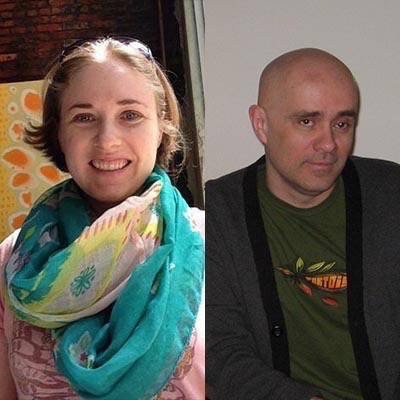
Douglas Smith and Jen Town
Poetry
Douglas Smith was born in San Juan, Puerto Rico. His first book is Judgments. His work can be read in Quarterly West, Cimarron Review, Hayden’s Ferry Review, Washington Square, Mid-American Review, and many other magazines. Two of his poems have just appeared in The Southern Poetry Anthology, Volume VII: North Carolina, published by Texas Review Press. A contributing editor at Lake Effect, he lives in North Carolina and teaches at Guilford College.
Jen Town’s poetry has appeared or is forthcoming in Mid-American Review, Cimarron Review, Epoch, Third Coast, Lake Effect, Crab Orchard Review, Waccamaw Journal, Unsplendid, and others. She earned her MFA in Poetry from The Ohio State University in 2008. Her manuscript, The Light of What Comes After, was a finalist for both the Moon City Poetry Award and the Cider Press Review Book Award in 2014.
Composed in the Form of Falling
She sleeps each night in her boat on the sea, and rows toward a distant cliff each day. Once a man said Dawn to her there, night a distance to travel. A bottle might contain her words, she dreams, and those words might be a field after rain, or the surface of flesh over bone, or a tongue. When she wakes at dawn, she presses her empty hands together, remembering.
Somewhere upon the sea, the farmer believes, a small boat rides. Look closer, for in that boat the body of a woman turns, alone, muttering into a bottle from the chamber of sleep.
Rowing in light, she imagines insects descending over those fields near the sea. Summer hums and churns the dangerous air, each kernel of the ripening corn a farewell. She still sees the hands of the man who held her there, the creases of dirt and halos of nails. In the stalks, where their bodies once mingled, pollen-drunk bees drone.
What else is a body, the farmer once wrote her, if not a figure of desire? Now he imagines, in a prayer, the curved scar on her left thigh, and the way his tongue slid down the ladder of her spine, and the unfolding of her body in joy. Each day he reads, in her absence, an unanswerable sentence composed of sea and sky and the punctuation of birds.
Here is the only world, she whispers, the lone mast a mark written against the given sky. She yearns to tell him how the arc of sea birds is the end of a story she once knew, how the lap of waves is the murmuring of a voice after love, how the night makes a consolation of stars. Each morning she rows toward his waiting figure, the hum of oars a slow song in her hands.
There, on the sea, held aloft, the cuneiform of a mast appears. Consider the farmer, his mouth open with sound, amazed on this earth by such return. Imagine the birds wheeling above her distant boat, and the light between. Now, in time, let the farmer leap with his body from the cliff, descending below the earth and the house and the unmade bed within. Let him leave the bees of the fields behind. He has become, in the abandon of his fall, an offering.
“ The private pursuit of language, Carl Phillips tells us in Coin of the Realm, ‘is a form of prayer, however secular the subject of the writing at hand.’ Desire compels such a pursuit. ‘Composed in the Form of Falling’ was triggered by, among other things, a conversation about desire and distance. ”
